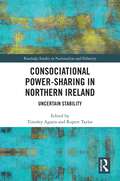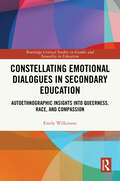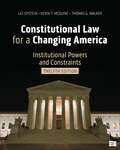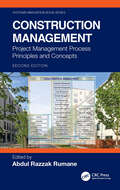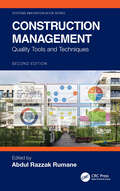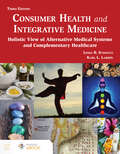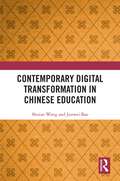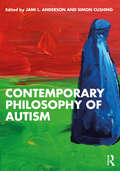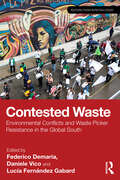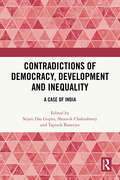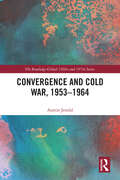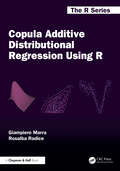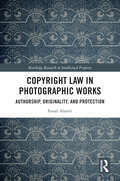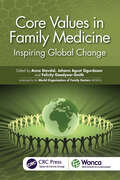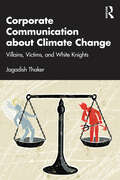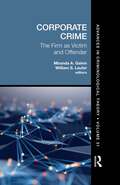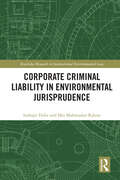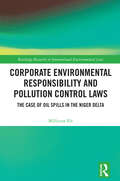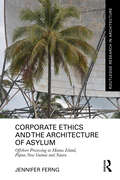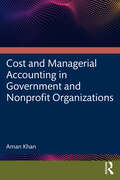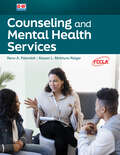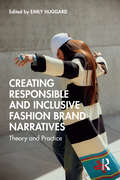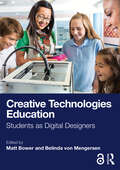- Table View
- List View
Consociational Power-Sharing in Northern Ireland: Uncertain Stability (Routledge Studies in Nationalism and Ethnicity)
by Rupert Taylor Timofey AgarinConsociational Power-Sharing in Northern Ireland, from leading scholars in the field, explores the evolution and challenges of consociational power-sharing in Northern Ireland for politics and societal relations.Contributors to this book highlight that scholarship on consociational democracy anticipates political stability and continuous integration in post-conflict societies. However, over 25 years on from the Good Friday Agreement concerns remain about the adequacy of consociational power-sharing to ensure a fully functional form of government capable of providing stability and of addressing deeper political and social issues: While violence is absent, ethno-national identities remain in a state of a fragile equilibrium, and aspirations for significant progress on key issues like truth, justice, mutual respect, and socio-political inclusion have not been met. The reasons as to why this is so, and what can be done to rectify it, are central to the arguments that animate this timely book.Consociational Power-Sharing in Northern Ireland will be of great interest to students and scholars in political science, law and constitutionalism, nationalism and ethnicity, and those interested in related topics in sociology and criminology. It will also appeal to practitioner communities related to power-sharing, political representation, and constitutional politics.
Constellating Emotional Dialogues in Secondary Education: Autoethnographic Insights into Queerness, Race, and Compassion (Routledge Critical Studies in Gender and Sexuality in Education)
by Emily WilkinsonThis innovative, autoethnographic study examines 12 stories of “wobble” moments—looking at “wobble” as an emotional experience—to illuminate new perspectives on LGBTQIA+ identity, school violence, racism, mental illness in students and teachers, and the emotional costs of empathy.Utilizing the author’s experiences as they navigate education’s most difficult years of practice from 2020 to 2022 and extending the existing scholarship on dialogical pedagogy and teacher identity by offering a framework that goes “beyond wobble,” it provides a new theory for how teachers can deconstruct the emotions that surround the heaviest moments of their practice, shift perspectives on situations and selves, and “see the light” of compassionate possibility in both person and practice.A sobering inquiry which provides valuable insight into the emotional landscape of a contemporary classroom embroiled in America’s culture wars and serves as a poignant exemplar of dialogical pedagogy in practice, it will appeal to scholars and post-graduate students of teacher education, educational psychology, and education policy.
Constitutional Law for a Changing America: Institutional Powers and Constraints (Constitutional Law for a Changing America)
by Kevin T. McGuire Lee J. Epstein Thomas G. WalkerIn Constitutional Law for a Changing America: Institutional Powers and Constraints, bestselling authors Lee Epstein, Kevin T. McGuire, and Thomas G. Walker show students how political factors influence judicial decisions and shape the development of constitutional law. The Twelfth Edition, updated with additional material such as recent court rulings, more than 500 supplemental cases, and greater coverage of executive, legislative, and judicial power, facilitates a deeper understanding of how the U.S. Constitution defines what institutions can and cannot do. This book is ideal for Constitutional Law courses in the two-semester sequence that covers powers and constraints. For courses that cover both rights and liberties and the separation of powers in one semester, see Constitutional Law for a Changing America: A Short Course.
Constitutional Law for a Changing America: Institutional Powers and Constraints (Constitutional Law for a Changing America)
by Kevin T. McGuire Lee J. Epstein Thomas G. WalkerIn Constitutional Law for a Changing America: Institutional Powers and Constraints, bestselling authors Lee Epstein, Kevin T. McGuire, and Thomas G. Walker show students how political factors influence judicial decisions and shape the development of constitutional law. The Twelfth Edition, updated with additional material such as recent court rulings, more than 500 supplemental cases, and greater coverage of executive, legislative, and judicial power, facilitates a deeper understanding of how the U.S. Constitution defines what institutions can and cannot do. This book is ideal for Constitutional Law courses in the two-semester sequence that covers powers and constraints. For courses that cover both rights and liberties and the separation of powers in one semester, see Constitutional Law for a Changing America: A Short Course.
Construction Management: Project Management Process Principles and Concepts (Systems Innovation Book Series)
by Abdul Razzak RumaneManagement process groups along with the processes in the knowledge areas having to do with the principles and concepts used in the development of major construction activities are very important in the overall construction management process. This volume covers the application of these activities that manage the construction project from inception through to the completion of the construction project.Construction Management: Project Management Process Principles and Concepts discusses the five elements of management functions which include planning, organizing, staffing, directing, and controlling, and explains how these activities/elements of management functions can be used in construction projects. Information about strategic planning, operational planning, intermediate planning, and contingency planning, and the steps involved with relevance to construction projections is offered in this volume. The different types of organizational structures, such as simple, functions, divisional, matrix, team-based, network, and modular, with an example organizational chart, are presented. Also covered are staffing processes such as acquisition, roles and responsibilities, assessment, team building, training, and development, along with directing and controlling elements of the management functions. This volume is rounded out with the inclusion of the five types of management processes, such as initiating, planning, executing, monitoring, controlling, and closing, along with applicable knowledge areas based on the PMBOK® methodology.This volume provides significant information and guidelines to construction and project management professionals (owners, designers, consultants, construction managers, project managers, supervisors, contractors, builders, developers, and many others from the construction related industry) involved in construction projects (mainly civil construction projects, commercial A/E projects) and construction related industries.
Construction Management: Quality Tools and Techniques (Systems Innovation Book Series)
by Abdul Razzak RumaneThe application of quality tools and techniques in construction projects has a great influence on the cost-effectiveness results of construction projects and achieving successful project performance. Quality management tools and techniques help in project planning, execution, monitoring, and control of the project and evolve a project management system that makes project deliverables.Construction Management: Quality Tools and Techniques provides the usage and application of various quality tools and techniques in different phases of construction project management focusing on three quality management processes involving the varying aspects of quality. This volume illustrates how important quality is for construction projects and offers an overview of construction projects along with a brief introduction to the different types of projects, the different phases of the life cycle, and the principles. Project Delivery Systems (PDS) along with their organizational relationship, participants, advantages, and disadvantages of each system are included. The book goes on to discuss the qualification of construction managers and the type of management systems and their roles during the different design stages from the beginning through to the handover of the project is also included.This volume provides significant information and guidelines to construction and project management professionals (owners, designers, consultants, construction managers, project managers, supervisors, contractors, builders, developers, and many others from the construction-related industry) involved in construction projects (mainly civil construction projects, commercial-A/E projects) and construction-related industries.
Consumer Health and Integrative Medicine, Third Edition
by Linda Baily Synovitz Karl L. LarsonToday, being a health consumer encompasses more than being knowledgeable about traditional medicine and health practice; it also requires one to be well-informed about the expanding field of complementary and integrative health and healthcare. Consumer Health and Integrative Medicine: A Holistic View of Alternative Medicine Systems and Complementary Health Care expands upon the many alternative modalities that other consumer health texts overlook. It includes chapters on major alternative medicine systems and healing modalities, including Ayurvedic medicine; traditional Chinese medicine; naturopathic and homeopathic medicine; mind-body interventions; energy therapies; botanicals; aromatherapy and essentials oils; and manipulative and body-based therapies. The authors' mission is to help readers increase their knowledge base and become informed consumers. New research and statistics regarding the various complementary and alternative methodologies. Three New Chapters: Native American Medicine and Healing Traditions (8), Kampo Medicine of Japan (11), and Traditional Arabic and Islamic Medicine (TAIM) (12)Changes in terminology to comply with updated National Center for Complementary and Integrative Health (NCCIH) terminologyNew information on the cost of health care in the U.S. as compared with other advanced countries, including prescription drug prices.Added content on health product advertising practices, including internet-based and social media advertising.Discussion of how consumers can protect their rights and more detailed information on current types of fraud. Consumer HealthAlternative & Complementary HealthcareIntegrative Health/MedicineHolistic Healing/Health/Medicine © 2026 | 350 pages
Contemporary Digital Transformation in Chinese Education
by Shutao Wang Junwei BaoAdopting a macro‑meso‑micro framework, this book explores the recent developments of digital transformation in Chinese education.From a macro perspective, this book examines the sociocultural background and policy environment of China’s educational digital transformation. At the meso level, it analyzes the dynamics and challenges of educational digitalization within the context of regional equity. Finally, it examines the impact of digital technologies on school practices at the micro level. By delving into the driving forces behind the digital transformation of education in China, and assessing its empowerment of regional equity and its impact on educational practices, this book will provide theoretical and practical support for future educational reforms and offer insights into the digital transformation of education in other developing countries.This book will attract academic researchers of educational technology and policy, policymakers, and educational administrators.
Contemporary Philosophy of Autism
by Simon Cushing Jami L. AndersonThis volume explores interesting and emerging philosophical questions related to autism. It sheds light on the ways in which cultural attitudes about autism have changed in the decade since the editors published their first volume on the philosophy of autism.So much about autism has changed in the last decade. Cultural attitudes about autism are far more nuanced. Self-identification as autistic has exploded, as have discussions of the political and social implications for being an out autistic person. This volume approaches a wide range of issues that autism raises in social and political theory, ethics, philosophy of social science, epistemology, metaphysics, and law. The issues addressed include moral responsibility, autism and gender, knowledge acquisition, the double empathy problem, social cognition, vulnerability in interpersonal communication, masking, the neurodiversity movement and destigmatization, and the effectiveness of ABA therapy. Each of the contributors, many of whom self-identify as autistic, has a personal connection with autism.Contemporary Philosophy of Autism will appeal to researchers and graduate students working in philosophy of mind, philosophy of cognitive science, epistemology, philosophy of medicine, and disability studies. It will appeal to those working in other academic fields such as developmental psychology, neuropsychology, cognitive psychology, and education.
Contested Waste: Environmental conflicts and waste picker resistance in the Global South (Routledge Studies in Political Ecology)
by Federico Demaria Daniele Vico Lucía Fernández GabardContested Waste’ examines socio-environmental conflicts involving waste pickers in the Global South, uncovering the systemic injustices that underpin contemporary waste policies. Driven by the privatisation of waste management, these conflicts expose the “recycling paradox”: while waste pickers make critical, uncompensated contributions to sustainability, they are further excluded.This book analyses how modern waste policies marginalise waste pickers, triggering conflicts in cities across Africa, Latin America, and Asia. Drawing on over 70 conflicts documented in the Global Environmental Justice Atlas, the book explores how privatisation, incineration, and waste enclosures displace informal recyclers and worsen the sustainability crisis. These processes exemplify “Capital Accumulation by Dispossession,” as waste streams are enclosed and privatised, excluding waste pickers, and “Capital Accumulation by Contamination,” as environmental burdens are shifted onto marginalised communities. The book also showcases waste pickers’ resilience as they organise to fight for justice and equitable waste systems.Essential for scholars, policymakers, and activists in environmental justice, development, and urban studies, this book reveals the structural drivers of waste conflicts and the transformative power of grassroots resistance in shaping sustainable and inclusive urban futures.
Contradictions of Democracy, Development and Inequality: A Case of India
by Sejuti Das Gupta Shouvik Chakraborty Taposik BanerjeeIdentity politics has widened representation for the marginalised groups in democracies, while neoliberalism has deepened inequality. This volume finds answers to the paradox of widening representation and worsening inequality especially in India exploring the themes of development and identity in recent times. Inspired by Caesar Basu’s works as a political thinker, this volume weaves in economic concerns with the socio-cultural aspects of identity and contends that representation is not sufficient. Further, it highlights the importance of reinstating redistribution to serve both democracy and development. It looks at neoliberal policies and how they maximise negative liberty by focussing on the individual thereby obliterating the question of the social location of individuals. The contributors to this volume investigate these issues through the lens of religion, gender, caste, and raise interdisciplinary questions concerning ecological conditions of labour, the institution of democracy and capitalist regimes, linkages among multiple sectors of the Indian economy, devaluation of women’s work in the care economy, material distribution of resources, and liberty and civil rights. This book creates a much-needed conversation between the study of development through the economic perspective and the cultural or political sociology perspective.It will be of interest to students and researchers of politics especially identity politics, economics, sociology and social justice, development studies, and social geography.
Convergence and Cold War, 1953–1964 (The Routledge Global 1960s and 1970s Series)
by Austin JersildThe academic debate in Western social science about the growing “convergence” or similarities between American and Soviet society acquired political significance in the diverse relationships that made up the global Cold War. Convergence and Cold War, 1953–1964 explores the consequences and challenges of convergence through a discussion of U.S.–Soviet relations, Sino-Soviet relations, and East–South relations.The book argues that the debate about convergence was a debate about the character of the broader Cold War itself, and the background to the more recent experience of contemporary globalization and its shared practices and norms. The volume begins by addressing how Americans debated the prospect of a less threatening socialist world shaped by the challenges of industrial modernity, while the Soviets hoped to imitate Western standards of living alongside developing supposedly more elevated forms of consumption, leisure, culture, trade, and economic exchange. The second section analyzes the way supporters of Chairman Mao in China associated the socialist bloc’s engagement with the West as an example of its deterioration and dangerous abandonment of socialist values and practices. The closing chapters examine how the Chinese communicated their frustration with the Soviets and East Europeans to postcolonial states in the Global South. Jersild unpacks this through a case study of Guinea-Conakry, which posed questions about the common practices and policies of the superpowers.This volume is a valuable resource to students and scholars of the Cold War and International Relations, as well as all those interested in postcolonial studies and the history of globalization.
Copula Additive Distributional Regression Using R (Chapman & Hall/CRC The R Series)
by Giampiero Marra Rosalba RadiceCopula additive distributional regression enables the joint modeling of multiple outcomes, an essential aspect of many real-world research problems. This book provides an accessible overview of this modeling approach, with a particular focus on its implementation in the GJRM R package, developed by the authors. The emphasis is on bivariate responses with empirical illustrations drawn from diverse fields such as health and medicine, epidemiology, economics and social sciences.Key Features: Provides a comprehensive overview of joint regression modeling for multiple outcomes, with a focus on bivariate responses Offers a practical approach with real-world examples from various fields Demonstrates the implementation of all the discussed models using the GJRM package in R Includes supplementary resources such as data accessible through the GJRM.data package in R and additional code available on the authors' webpages This book is designed for graduate students, researchers, practitioners and analysts who are interested in using copula additive distributional regression for the joint modeling of bivariate outcomes. The methodology is accessible to readers with a basic understanding of core statistics and probability, regression, copula modeling and R.
Copyright Law in Photographic Works: Authorship, Originality, and Protection (Routledge Research in Intellectual Property)
by Faisal AlamriThis book presents an original theory of copyright authorship tailored for photographic works, grounded in the concepts of categorical intention, channelled selection, and causation. By addressing the unique dual nature of photography, where mechanical processes intersect with creative choices, it offers a fresh perspective on a longstanding legal challenge.Through a critical examination of select case law with a focus on Anglo-American law, the book highlights the complexities and inconsistencies in the current copyright protection for photographs due to their dual nature, which exhibits both mechanical and creative characteristics. It argues for moving beyond the conventional one-size-fits-all approach for copyright concepts in favour of adopting a tailored, contextual approach that acknowledges the nature and characteristics of the category of work in question. The book also alludes to emerging technologies such as artificial intelligence and machine learning models, considering their implications for copyright and creative expression. It also discusses how the history of copyright protection of photographic works may illuminate the path towards dealing with conflicts between copyright and perceived mechanical mediums of creative expression.This book will be of interest to researchers in copyright law and intellectual property law, especially those engaged with the legal treatment of mechanically produced creative works. It offers valuable insights into the evolving relationship between law, technology, and authorship in the digital age.
Core Values in Family Medicine: Inspiring Global Change (WONCA Family Medicine)
by Felicity Goodyear-Smith Anna Stavdal Johann Agust SigurdssonThis new book explores the core values of family medicine nationally, regionally, and globally, to identify if and/or where there is consensus and where these diversify in relation to contextual factors. Aligned with the WHO’s definition of primary healthcare and goal of universal health coverage and the United Nations Sustainable Development Goals, the book documents a global enquiry by teams of experts representing each world region on the vision, mission, core values and principles, and definition of family medicine in different countries. Each team has adopted different approaches and strategies in their exploration, findings, and conclusions.A common identity for family doctors is important for research agendas, training, recognition of the specialty, and advocacy. However, there is much diversity within and across the regions in the training and the practice of the discipline of family medicine, reflected in the core values. The ultimate goal is a shared vocabulary of humanity for colleagues throughout the world, enriched rather than hindered by their differences.KEY FEATURES: Addresses the core values and principles in family medicine and primary care across the globe, built around the central elements of care that is patient centred, equable, and community and science oriented, with professionalism and cooperation as key themes Supports primary care/family medicine providers in their dual goals of caring for the whole person and adapting to the evolving needs of the population of people under their care, tailored to reflect the specific needs in different world regions Considers the challenges of fragmented care, digital technologies, comorbidities, and growing health inequity Accessible, practical, and international The book will be an invaluable guide for general practitioners, family physicians, family medicine specialists, and other primary care doctors and a useful reference for other primary care health professionals including practice, school and other primary care nurses, medical assistants, paramedics, and community pharmacists. It will also serve as recommended or supplementary reading in undergraduate medical and nursing programmes, in university-based postgraduate courses and master programmes in relevant primary care–related topics, and in vocational training programmes in general practice/family medicine.
Corporate Communication about Climate Change: Villains, Victims, and White Knights
by Jagadish ThakerEmbedded in the emerging field of climate change communication, Thaker provides a comprehensive analysis of enablers and barriers to corporate action on climate change, business role and influence on media coverage of climate change, and its impact on public opinion and the policy-making process.Focusing on extensive academic research, business reports, case studies, and best practices from around the world, this book offers a practical guide to effective strategies in corporate climate change communication, including leadership communication, rebuilding public trust amidst greenwashing scandals, and engaging stakeholders with business action on climate change. The book provides new directions on the role of social media influencers, artificial intelligence, and big data in enhancing transparency in business actions and effective communication with key stakeholders.This book is an essential read for students, scholars, and professionals interested in the emerging fields of climate change communication, strategic communication, and related areas of sustainability and Environmental, Social, and Corporate Governance (ESG) communication.
Corporate Crime: The Firm as Victim and Offender (Advances in Criminological Theory)
by William S. Laufer Miranda A. GalvinThis volume speaks to the fundamental issues inherent in trying to understand the who-what-where-and-whys of corporate crime. Only in addressing these larger issues does it become possible to begin to integrate the study of corporate crime into the larger criminological theory literature. A collection of chapters by experts in the field grapples with three deceptively simple questions: When are firms morally and legally responsible agents? What are the harms of corporate wrongdoing and who are the victims? What theories offer insight to explain corporate wrongdoing? In the first section, chapter authors wrestle with what it means for a corporation to have agency enough to commit a violation of law as well as what philosophies of punishment might apply when there is no body to jail. The second section focuses attention on the often unnamed, ambiguous, or even ignored victims of corporate crime. Many authors in this section take a broad view of “victimization,” speaking to the ways in which the intentional acts of corporations produce negative consequences for individuals and society at large through both the violation of law and the use of corporate power to produce laws that do not problematize corporate behavior. The third section turns to issues in corporate offending research, including the circumstances that beget offending, how corporations may be thought to have “life courses,” and the role of the State in structuring criminal opportunity. The editors wrap up the volume by proposing a framework for developing a more comprehensive system of criminal responsibility for corporate actors.The chapters in this volume underscore the failures of the current system and are intended to inspire readers to push for change. This important work will be of interest to a wide range of criminologists and has potential to shape the future of corporate crime theory and research. It is ideal for use in graduate seminars and upper-level undergraduate courses.
Corporate Criminal Liability in Environmental Jurisprudence (Routledge Research in International Environmental Law)
by Mia Mahmudur Rahim Indrajit DubeEnvironmental jurisprudence is a dynamic field that integrates insights from various disciplines, including basic sciences, earth science, economics, and law. At its core, this discipline emphasizes the importance of enforcing rights, as environmental pollution poses significant threats to individuals and society as a whole. The repercussions of pollution are not confined to the immediate vicinity; they can reverberate across vast regions and impact countless future generations. Addressing pollution as a wrong or crime demands a nuanced understanding of the law, making the study of environmental jurisprudence essential.This book explores corporate polluter liability within the framework of environmental jurisprudence. While protective measures for the environment have been embedded in various statutes since the early 20th century, the notion of environmental jurisprudence has only recently come to the forefront of legal discourse. This field is crucial for safeguarding the natural and legal rights of individuals, communities, and the state. With a comprehensive approach that encompasses both national and international dimensions, this book critically engages with the foundational concepts of environmental jurisprudence, exposing the rampant environmental violations perpetrated by corporations and outlining how these entities can be held accountable within regulatory frameworks. Furthermore, it provides a thorough analysis of essential international instruments aimed at combatting corporate-induced environmental degradation, offering recommendations to elevate corporate criminal liability within the realm of environmental jurisprudence scholarship.Highlighting the urgent need for accountability but also inspiring action toward a sustainable future, this book will interest legal scholars researching on criminal liability and environmental law.
Corporate Environmental Responsibility and Pollution Control Laws: The Case of Oil Spills in the Niger Delta (Routledge Research in International Environmental Law)
by Millicent EleThis book critically examines the corporate environmental responsibility of major oil companies operating in Nigeria’s Niger Delta, focusing on oil spills and comparing regulatory frameworks in Nigeria, the US, the UK, and the EU. It provides a theoretical foundation for holding these companies to the same environmental standards in Nigeria as they adhere to in more advanced jurisdictions.Analysing Shell’s oil spill environmental performance data, the book assesses how its operations in Nigeria compare with global performance figures. Additionally, it evaluates Nigerian environmental laws, highlighting deficiencies that may contribute to persistent oil pollution. Furthermore, it explores issues of regulatory capture, corporate environmental crime, and the transnational litigation of Nigerian oil spill cases in the US, the UK, and the EU. The Petroleum Industry Act (PIA) 2021 is comprehensively assessed in the context of corporate environmental governance and oil pollution control.To propose solutions, the book examines legal frameworks for strengthening corporate due diligence and accountability. It advocates for a robust legal regime to address the clean-up liability of pre-existing (stale) oil spills in the Niger Delta, drawing insights from the UK/EU laws on contaminated land, the US Comprehensive Environmental Response, Compensation, and Liability Act (CERCLA or the Superfund), and the UK laws on oil infrastructure decommissioning. Additionally, the book introduces a novel failure to prevent oil spill offence in Nigeria, an omission-based liability inspired by the UK Bribery Act 2010 and the UK Criminal Finances Act 2017.This book will be of interest to researchers and practitioners in the field of environmental law, pollution, and land law.
Corporate Ethics and the Architecture of Asylum: Offshore Processing at Manus Island, Papua New Guinea and Nauru (Routledge Research in Architecture)
by Jennifer FerngCorporate Ethics and the Architecture of Asylum engages innovative perspectives to understand our contemporary crisis of forced displacement and detention practices in the Pacific.Multinational contractors responsible for the construction and maintenance of regional processing centres in Papua New Guinea and Nauru have flourished as powerful historical actors, exerting global dominance over the lives of asylum seekers wishing to come to Australia. Transitioning from the policeman or security guard towards the subject of the asylum seeker, this book contends that entanglements between architecture and law represent important epistemic models to interrogate how asylum can be understood and reconceptualised. Proposing diverse forms of visual and textual evidence, asylum is repositioned as a dynamic, ever-changing countermeasure against xenophobic sentiments around offshore processing. Over six chapters, Corporate Ethics examines how the regional processing centres of Manus Island and Nauru are deeply connected to the intellectual discourses of care, environmental precarity, human rights, and sovereignty. From Rembrandt’s De Nachtwacht or Night Watch (1642) to recent advancements in artificial intelligence and legal testimonies, picturing the future of asylum serves as a critical tool to resist state authoritarianism and the rise of corporate malfeasance in the built environment.This book will be of interest to researchers and students of humanitarian architecture, architectural history, and Asia Pacific politics.
Cost and Managerial Accounting in Government and Nonprofit Organizations
by Aman KhanTo remain financially viable, all organizations, including government and nonprofit organizations, need to maximize efficiency, improve performance, and deal with complex problems. Managing costs and operations are two of the most essential elements for the successful operation of an organization. This timely book provides an introduction to cost and managerial accounting in government and nonprofit organizations, with an emphasis on cost basics, cost accounting methods, and cost management and control.The book is divided into three parts: Part I deals with cost basics, with an emphasis on basic cost concepts, cost behavior, and cost analysis. Part II discusses methods commonly used in cost accounting. Included in this category are job costing, contract costing, process costing, cost allocation, and activity-based costing. And Part III looks at cost management and control. Three topics are discussed here: standard costing, quality control, and budgeting for planning and control. The book concludes with a brief discussion of emerging trends in cost and managerial accounting. With an emphasis on relatability and practical applications, examples have been drawn from real government and nonprofit organizations. Graduate students in public administration and management, as well as practitioners in government and nonprofit organizations, will find this book an essential foundation for understanding public accounting’s unique challenges.
Counseling and Mental Health Services
by Reno A. Palombit Alyson L. McIntyre-ReigerCounseling and Mental Health Services is a text designed specifically for high school students who are interested in exploring facets of mental health services, including related careers like psychology and counseling, social work, psychiatry, and life coaching. The text begins by addressing students’ understanding of mental health, before expanding outward to relationships with others, structures of the nervous system and neurodivergence, disorders and treatments, and counseling and mental health careers and career skills. With a focus on self-reflection, this text guides students to understand mental health concepts before moving on to relationships, brain science, and career skills.
Crabs
by Marley RichmondCrabs pinch and grip with strong claws. People may catch and cook crabs to eat! Beginning readers hone their phonics skills while learning all about crabs and where they live. As readers practice decoding words with r-blends, they gain science knowledge. Every Stairway Decodables nonfiction book combines multiple aspects of the Science of Reading to support small group instruction, independent reading, and reading practice at home.
Creating Responsible and Inclusive Fashion Brand Narratives: Theory and Practice
by Emily HuggardThis book introduces the theories and frameworks necessary to drive meaningful social change in fashion brand communication, illustrating their applications with examples of brands that prioritize social justice, decolonization, and environmental sustainability in their practices and communication strategies.Drawing on social, consumer, and cultural theories—such as Indigenous dress theory, circularity, fat liberation, and social reproduction—this book encourages students to think critically about brand communication in ways that are relevant, impactful, and aimed at transforming discourse and ideologies, rather than focusing solely on products.Through case studies ranging from Polo Ralph Lauren’s collaboration with Indigenous weaver Naiomi Glasses to material regeneration at Veja, the authors demonstrate how these narratives can be applied in practice while raising ethical questions about transparency and authenticity in fashion brand messaging. Readers will not only gain an understanding of why more inclusive and equitable brand narratives are essential but also develop the knowledge and critical thinking skills needed to analyze, interpret, and contribute to the ongoing transformation of fashion brand storytelling.Creating Responsible and Inclusive Brand Narratives will be of interest to advanced students of Fashion Communication, Marketing and Brand Management.
Creative Technologies Education: Students as Digital Designers
by Matt Bower Belinda Von MengersenThis book is a groundbreaking exploration of how to empower students as innovative creators in an increasingly technology-driven world.With rapid advancements in Artificial Intelligence and other technologies reshaping society, this text champions the critical role of creativity in education, explaining how teachers can equip learners with skills for the future workplace and foster their enjoyment of learning through design. Bridging theory and practice, this collaborative work synthesises global research to provide actionable strategies for teachers. From multimedia and game design to Augmented Reality, robotics, 3D fabrication and more, it offers practical insights into how students can use cutting-edge technologies to design, invent, and solve problems creatively. The constructively sequenced and interconnected chapters feature evidence-based principles and real-world vignettes across all levels of schooling.Written by a team of academic experts, this open-access resource is a must-read for educators, researchers, and anyone passionate about unlocking the creative potential of the next generation using technology.
